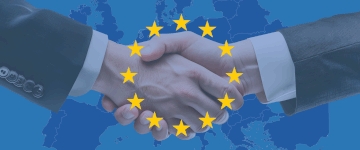
Eurocadres Steering Committee meeting
Πραγματοποιήθηκε στο Αμβούργο στα γραφεία της CFDT, στις 10 και 11 Μαϊου 1999 με τη συμμετοχή του Προέδρου του ΙΝΕ/ΟΤΟΕ σδ. Αριστοτέλη Λάκκα, η δεύτερη συνάντηση του Steering Committee των Eurocadres (Διευθυντικά Στελέχη Ευρωπαϊκών Επιχειρήσεων).
Στη συνάντηση συζητήθηκαν οι τελευταίες εξελίξεις που αφορούν τα διευθυντικά στελέχη σε ευρωπαϊκό επίπεδο, θέματα που έχουν σχέση με την απασχόληση και τις εργασιακές σχέσεις, ευρωπαϊκά προγράμματα που μπορούν να χρηματοδοτήσουν εκπαιδευτικές και ερευνητικές δράσεις καθώς και ζητήματα που αφορούν τον κοινωνικό διάλογο στην Ευρώπη.
Στη διάθεση κάθε ενδιαφερόμενου υπάρχουν μια σειρά από ντοκουμέντα που έχουν σχέση με τα παραπάνω θέματα.
Steering Committee, May 2000: Agenda (00-223)
Meeting of the 26th EUROCADRES Steering Committee
on 25 and 26 May 2000 in Paris
Agenda
1 Minutes of the previous meeting
2 Recent developments relevant to P&MS at European level
3 Preparation of the EUROCADRES Symposium 2000
4 Preparation of the EUROCADRES General Assembly 2000
5 New developments regarding the recognition of diplomas and qualifications
6 Follow-up on the mobil-net
6.1 Training seminar
6.2 Mobil-net Charter
7 Contacts with the Portuguese and French EU Presidency
8 EUROCADRES finances and means
9 Developments affecting P&MS at national and sectoral level
10 Any other business
Mobil-Net Charter (99-173E)
Introduction
For EUROCADRES, it is essential that professional and managerial staff have opportunities to exercise their right to a chosen mobility under favourable conditions anywhere in Europe. The free circulation of professional and managerial staff allows them to develop their competencies, enhances their capability to find jobs and thus contributes to strengthening European competitiveness, growth and employment.
Several unions affiliated to EUROCADRES provide services and information to members who intend to settle or work in another Member State or to return home. Some unions give employment services to members who are seeking jobs in other Member States. Others entered co-operation agreements on guest membership for mobile members. Thus many EUROCADRES affiliates are highly involved in issues linked to mobility and they have a great amount of expertise and good practice.
In the resolution on mobility of professional and managerial staff adopted by the Fifth EUROCADRES General Assembly in December 1997, it was agreed that EUROCADRES and its member organisations must build up a guidance system for professional and managerial staff that intend to work in another Member State. Professional and managerial staff must have access to information about relevant trade unions they may join in other Member States. Trade unions should consider a system for mutual recognition of membership or guest membership guided by experiences gained in some unions.
The 9th ETUC Congress in June/July 1999 stated that the Europeanisation of industrial relations requires an Europeanisation of trade unions. This "means both such steps as the cross-border recognition of trade union membership and the mutual provision of trade union protection and services". "The adoption by the ETUC's affiliates of a Charter for mutual recognition of trade union protection across borders for all working people, independently of their national affiliation, could signal the right direction for developing a European trade union awareness and allow a stronger rank-and-file identification with the ETUC as the representative of all Europe's trade unions and workers."
The Congress committed the ETUC to prepare a Charter of mutual recognition of trade union membership among ETUC affiliates.
EUROCADRES proposes a framework charter for co-operation agreements between unions regarding trade union members working in another European country and making it easier for those to come in contact with the relevant unions there.
This is a document that is not of a legal nature but shows our common political will (see background, purpose, Arts. 1 and 2). At the same time, it will allow interested organisations to choose or not to choose some of the options suggested (see Arts. 3 and 4) taking account of diverse situations, trade union structures and needs.
EUROCADRES encourages affiliates to make their participation in the Charter known by indicating this, for instance, on their membership cards and/or headed paper.
Framework Charter for mobile P&MS
EUROCADRES mobil-net
adopted by the General Assembly 30.11.1999
Background
P&MS are increasingly mobile in the EEA labour market and throughout the whole Europe. Opportunities, however, are constrained by national social security systems, inadequate labour market information and limitation in mutual recognition of qualifications and diplomas.
Purpose
EUROCADRES Mobile Net is the name of a co-operation agreement reached by unions affiliated to EUROCADRES. The aim is to promote and protect individual union members, who are P&MS, when they move their employment across national borders within Europe.
EUROCADRES affiliates have adopted the following agreement:
Article 1
EUROCADRES affiliates will assist individual members of other affiliates who seek information and advice on employment and related labour market issues.
Article 2
EUROCADRES affiliates will provide mobile members with information about EUROCADRES affiliates in other European countries.
Article 3
EUROCADRES affiliates may, when signing the Charter, specify whether in addition they are willing to offer the following:
A) a familarisation programme on working and living conditions in the host country;
B) access for mobile members of other EUROCADRES affiliates to all or some services provided by the host union;
C) legal assistance in cases of dispute with the employer (it will be offered under certain circumstances)
Article 4
Subject to affiliates own rules on membership, (e.g. membership requirements that relate to occupational status) affiliates may agree that:
A) a member of a EUROCADRES affiliate has the right to become a member of the union in the host country; or get bilaterally agreed membership service
B) in the case of more than one year's employment, the employee should normally become a member of a EUROCADRES affiliated union in the host country
C) where a transfer of continuous membership from a union in one European country to a union in another takes place continuous membership of the first union will be regarded as being equivalent with that of the previous union;
D) union membership of cross-border P&MS shall be a matter to be regulated by unions concerned.
E) Dual membership in both the union of the home country and of the host country will be organised, when appropriate.
Article 5
The EUROCADRES Charter aims at being a framework instrument that can be complemented by bilateral, sectoral, cross-border or multilateral agreements between affiliates.
Article 6
EUROCADRES is committed to follow up the implementation of the Charter.
Article 7
EUROCADRES affiliates that sign the Charter will disseminate information on it and appoint a contact person in charge of its implementation.







_360.jpg)

